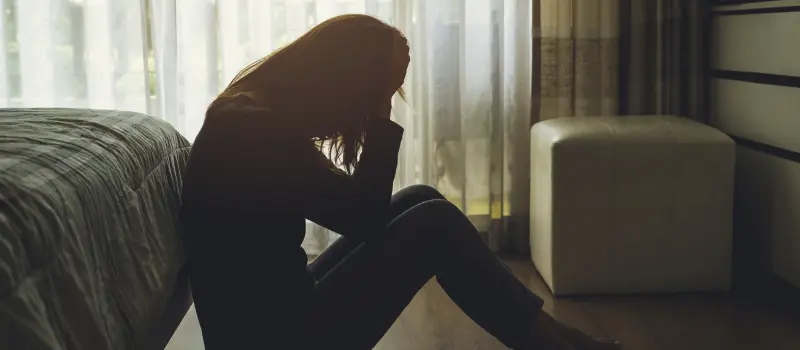
Table of Contents
Yes, Traumatic Brain Injuries Can Cause Depression—Here’s How to Cope

Written By: Ethan Cohen BSN, RN

Clinically Reviewed By: Dr. Don Gasparini
Updated: March 12, 2024
5 min.
Data shows that over half of people develop depression during the first year after a traumatic brain injury. With proper treatment, though, healing is possible.
Learn more about our Clinical Review Process
Table of Contents
After enduring a traumatic brain injury (TBI), people tend to experience a range of symptoms like headaches, cognitive impairment, or, in extreme cases, coma. While these impairments are to be expected, there’s a lesser-known symptom affecting many TBI survivors: depression.
According to many studies, major depressive disorder is the most common psychiatric disorder after TBI, affecting over one-quarter of people who endure a traumatic head injury, including those suffering from a severe or mild TBI. By contrast, only about 8% of adults in the general population experience a depressive episode annually. Below, we delve into the link between TBIs and depression, including data on the conditions, why they’re linked, and how to seek treatment for both.

Depression treatment for traumatic brain injury survivors
Begin your healing journey today.
Data on traumatic brain injuries and depression
As mentioned, depression is a common symptom experienced by TBI survivors. A 2003 study of over 550 people hospitalized after TBI showed that over half (52%) developed depression during the first year after injury. Earlier research shows that nearly two-thirds of people (61%) develop depression within the first seven years after a TBI. Similarly, a study of adolescent athletes found that a sports concussion was associated with a three-fold increase in the risk for depression compared to those athletes without a history of brain injury.
When someone suffers from depression during their recovery from a TBI, it can result in other complications, research shows, like aggression, anxiety, and, in some cases, higher rates of suicide attempts. If you’re having thoughts of harming yourself or someone else, this is a mental health emergency, and you should contact The Suicide & Crisis Lifeline by calling or texting 988.
While major depressive disorder has been found to be among the most common impairments post-TBI, it’s one of many mental health conditions for TBI survivors to be aware of. Across the board, TBIs are linked with conditions like post-traumatic stress disorder (PTSD), anxiety disorder, mood disorder, schizophrenia, and substance use disorder, research shows.
What causes depression after a traumatic brain injury?
Depression after a TBI can have multiple causes—here are some of the most common:
Physical changes to the brain
The physical trauma of a TBI can cause damage to areas of the brain that regulate mood, leading to changes in neurotransmitter levels and brain function associated with depression. Essentially, there are areas of the brain directly responsible for regulating emotions, and if a TBI affects those areas, it can result in chemical changes that affect emotional responses.
Emotional response to the injury
Coping with the consequences of a TBI, such as physical disabilities, cognitive impairments, or changes in relationships, can lead to feelings of loss, frustration, and hopelessness, contributing to an environment in which depression is more likely to occur.
Factors unrelated to the injury
Some people are at a greater risk of developing depression after a TBI than others. This increased risk is based on variables such as personal or familial history of depression, previous substance use disorder, or the existence of other mental health diagnoses prior to the TBI. There are also several socioeconomic factors that can put a person at a higher risk for developing depression post-injury, such as financial instability and lack of social support.
Signs of depression after a traumatic brain injury
Depression in TBI survivors can present similarly to depression in people without brain injuries, but there may be additional factors related to the injury. If you or a loved one are recovering from a TBI and notice any of the symptoms mentioned below, it’s essential to seek support and evaluation from healthcare professionals knowledgeable about TBIs and mental health. Some signs of depression in TBI survivors may include:
- Persistent sadness or low mood
- Loss of interest or pleasure in activities once enjoyed
- Changes in appetite or weight
- Difficulty sleeping or sleeping too much
- Fatigue or lack of energy
- Feelings of worthlessness or guilt
- Difficulty concentrating or making decisions
- Memory problems or forgetfulness related to the injury
- Irritability or mood swings
- Physical symptoms such as headaches or digestive issues, which may be related to the injury or exacerbated by depression

Depression Extends Beyond the Mind: Physical Symptoms of Major Depressive Disorder
Charlie Health Editorial Team
Treatment for depression after a traumatic brain injury
As mentioned, experiencing symptoms of depression is common after a brain injury, and with professional help, healing is possible. Treatment for depression after a TBI must be handled through a multidisciplinary approach, including therapy, medication management, and physical rehabilitation.
Cognitive behavioral therapy (CBT)
CBT is a form of talk therapy that helps people address the way they think, feel, and behave, with the goal of managing how they see themselves. This form of therapy can help people who are dealing with depression post-TBI learn to manage their emotions and thoughts surrounding their recovery. For instance, one aspect of CBT, known as “behavioral activation therapy,” can help increase a person’s willingness to engage in pleasurable activities again despite the challenges that have arisen due to their injury.
Medications
Antidepressants are commonly used in situations of depression after a brain injury, specifically selective serotonin reuptake inhibitors (SSRIs) and serotonin-norepinephrine reuptake inhibitors (SNRIs). These medications can help reregulate the chemicals in the brain connected with the management of emotions, which may have been affected by the injury.
Rehabilitation
In some cases, getting help to improve physical and cognitive functioning can help people improve their quality of life and depression symptoms. This may include types of speech therapy and physical rehabilitation. While helpful, these forms of treatment are not a replacement for professional mental health support.

Support for depression at Charlie Health
If you or a loved one are struggling with depression or another mood disorder after a traumatic brain injury, Charlie Health is here to help. Charlie Health’s virtual Intensive Outpatient Program (IOP) provides more than once-weekly mental health treatment for young people and families dealing with complex mental health conditions, including depressive disorders and other mood disorders. Our expert clinicians incorporate evidence-based therapies into individual counseling, family therapy, and group sessions. With this kind of holistic treatment, managing depressive symptoms post-TBI is possible. Fill out the form below or give us a call to start healing today.




